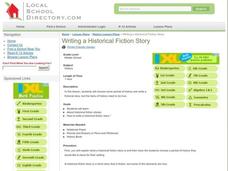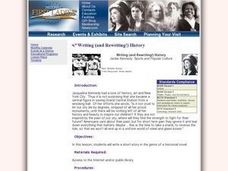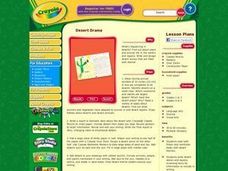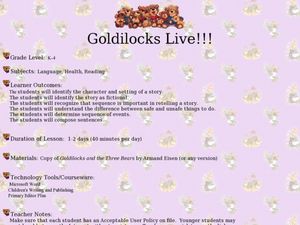Curated OER
The Power of Fiction
Students explore fiction that moves individuals to social action. For this literature lesson, students read The Jungle by Upton Sinclair and analyze its literary worth as well as its investigative journalism. Students investigate other...
Curated OER
Writing a Historical Fiction Story
What is historical fiction? After explaining the difference to your learners, it's time to give each learner a try! With your support, encourage them to research, plan, and write their own historical fiction story. Don't forget to have a...
Curated OER
Fiction Elements in Hatchet
Students read or listen to Hatchet by Gary Paulsen, identify elements of fiction, develop writing, thinking, and organizing skills, and create PowerPoint slides based on the story.
Curated OER
Rudyard Kipling's "Rikki-Tikki-Tavi": Mixing Fact and Fiction
"Rikki-Tikki-Tavi," from The Jungle Book, offers young readers a chance to examine how Rudyard Kipling uses setting and personification to bring to life the brave mongoose who battles cobras to protect his family. Class members...
Curated OER
Comparing Fiction and Nonfiction
Fifth graders compare and contrast an informational article with a fictional story. They read the story "The Contest" as a class, and discuss the different types of literature genres. Next, they complete a vocabulary worksheet and a...
Curated OER
Pic-A-Fic: Choosing Fiction for Every Taste
Sixth graders examine and categorize a selection of title representing fiction genres. In this fiction genres instructional activity, 6th graders analyze and identify a variety of titles in the fiction genre. Students then find these...
Curated OER
Introduce: Prediction
What will happen next? Leave readers at a cliffhanger as they practice prediction strategies while listening to a story. Pupils start by making guesses based on the book's cover and title, discussing the techniques they use to make these...
Curated OER
Science Fiction
Students explore writing science fiction books. For this creative writing lesson, students become familiar with science fiction and write their own science fiction story. Students use correct sentences and paragraph structure to write...
Curated OER
Introduction to Main Events
Identify main events in a text. Readers will read The Kissing Hand and discuss the main events of the story. They will use sentences strips to write down events and place them in order. Alternative books are suggested.
Curated OER
Build Mastery: Sequencing
Writing a summary is much easier once you've laid out the sequence of events. Show readers how these two skills are intertwined using this graphic organizer. Review the meaning of sequencing first, presenting the chart and possibly...
Curated OER
Identifying Text Features of a Self-Written Fable
Make learning the parts of a book fun by having pupils construct their own glossary entries, table of contents, and title page. Beginning with a review of text features and a hunt for examples, kids use previously written fables to...
Curated OER
What Makes a Novel a Novel?
They always say to write what you know. This approach is used to get middle schoolers prepared to write novels of their own. Using a favorite book as a model, potential novelists respond to prompts that ask about characters, plot, main...
National First Ladies' Library
Writing (and Rewriting!) History
Middle schoolers differentiate between fiction and non-fiction, discuss historical fiction, which combines both genres, choose historical novel from list and read independently, and write original short stories that combine elements of...
Curated OER
Desert Drama
Students read both fiction and nonfiction books with desert themes. Then they write desert stories and reports, reviewing texts for information to include in writing. Students also design desert scenes with details and setting elements...
Curated OER
Lesson 4: Theme Matters
This useful approach to determining themes based on specific details from a book is aimed at readers of Jerry Spinelli's Maniac Magee. It could also easily be adapted for use with other books or readings. The class identifies recurring...
Curated OER
Antagonist
Young learners explore the antagonist. They retell Hansel and Gretel and identify the witch and the stepmother as antagonists. They then brainstorm common character traits of an antagonist, and then write a paragraph describing...
DeKalb County Schools
Compare/Contrast
A series of reading activities is sure to engage your young readers! Based on comparing and contrasting ideas, the packet provides opportunities to compare characters, themes, texts, and other elements of fiction.
Curated OER
Story Elements
Sixth graders use several pieces of literature to identify specific story elements. In this story elements lesson, 6th graders analyze the story element of character, character traits, and setting for the example stories. Students work...
Curated OER
Hyper Book Reports
Fifth graders create a multimedia book report using a tree map to classify the elements fo fiction books.
Urban Education Exchange
Lessons and Units: The Watsons go to Birmingham—1963 5TH GRADE UNIT
Get ready to read The Watsons Go to Birmingham - 1963 with a lesson about historical fiction. Spanning several centuries, the resource prompts learners to guess the historical era of a story based on a word or phrase...
Curated OER
Comparing and Contrasting Fiction and Nonfiction Using Graphic Organizers
Students compare and contrast fiction and non-fiction selections. In this writing skills lesson, students use different forms of graphic organizers to compare "The Three Little Pigs," to Wiesel's Night.
Curated OER
Science vs. Science Fiction
Young scholars acknowledge the difference between science and science fiction through a compare/contrast activity. They discuss their reading materials together. Students identify characteristics specific to science fiction.
Curated OER
Goldilocks Live!!!
Study story elements with your young learners. Read Goldilocks and the Three Bears and discuss the order of events by making a story panel out of butcher paper. Sentences are given as suggestions for the panel, though you may...
Curated OER
Against the Odds
What factors help people achieve goals? What factors prevent people from achieving goals? What are the elements that need to be in place to make a team function well? Using Damien Lewis’ Desert Claw and John Francome’s Winner Takes All,...























